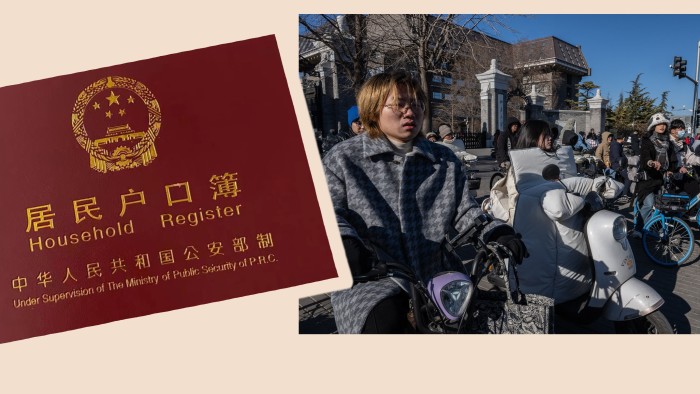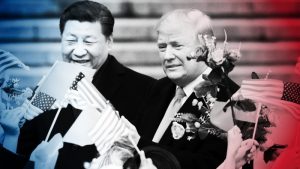How a Mao-era system creates second-class citizens in modern China

Not until Kim reached middle school in Beijing did she discover that a piece of Communist party bureaucracy would shape her life — as it does for many of China’s 1.4bn people.
Because her family was not originally from Beijing, she was required under arcane residence laws known as the hukou system to finish her schooling and sit the country’s gruelling university entrance exam in her parents’ distant home village.
The daughter of successful businesspeople, Kim refused to go, arguing she had never lived in the village. This cost her access to university, ruining her career prospects.
“The hukou system has caused me many problems,” said Kim, who is now in her 30s and works at her cousin’s small company. The system “represents inequality and has affected me throughout my life”.
China’s hukou system, which in effect treats people with rural household registrations as second-class citizens, has long been seen as deeply socially regressive. But recent anaemic growth is putting increasing scrutiny on the system’s cost to the world’s second-largest economy.
Xi Jinping’s government, which is trying to pep up consumption and counter a property market slump, in July released a five-year plan calling for the relaxation of hukou rules in mid-sized cities to “fully unleash the huge domestic demand potential” from urbanisation, which has slowed since the pandemic.
But Beijing has tinkered many times before with the system, introduced in 1958 by Mao Zedong to control population movements into the cities from rural areas. Many scholars believe the government should go further and scrap the system altogether.
“Abolishing the hukou system could provide just the sort of growth momentum that Xi needs to revive confidence in the Chinese economy,” said Neil Thomas, a fellow at the Asia Society Policy Institute’s Center for China Analysis.


Because a hukou governs access to local government services, having one from China’s wealthiest municipalities, particularly Beijing and Shanghai, entitles the holder to the best education and healthcare, easier access to stable government jobs and other privileges.
Abandoning hukou would encourage more rural workers to move to more productive jobs in cities, said analysts. While massive migration to China’s cities in recent decades has lifted the country’s headline urbanisation rate to 66 per cent as of last year from 43 per cent in 2005, at least a quarter of city dwellers lack an urban hukou. Many migrant workers crowd into neighbourhoods on the margins of the big cities, such as Yuxinzhuang in northern Beijing.
Scrapping the system would give migrant workers better access to public health and education, leaving them with “more money free for consumption, which means you address some of the broader economic imbalances that China’s facing”, said Thomas.
But fully scrapping hukou would be “easier said than done”, Ivy‐sw Ng, Asia-Pacific chief investment officer at DWS, wrote in a note this month.
Residents of first-tier municipalities would resist losing their privileges, while city governments would balk at the cost of investing in additional infrastructure and services. Many of the 298mn migrant workers who already live in urban areas lack access to the best healthcare, education and public services.
Furthermore, the Communist party still uses the system to maintain social control. Xi, in particular, has said China needs to prevent a concentration of the population in the largest cities. The system is controlled by the Ministry of Public Security, which has little interest in reform, said scholars.
The challenge for the government is that “they have already done whatever is possible [on hukou] without changing the fundamental political system”, said Ernan Cui, analyst at research group Gavekal.
While some smaller cities have abandoned hukou altogether as part of gradual reforms, obtaining one in China’s largest municipalities, particularly Beijing and Shanghai, has become even more difficult, according to Yao Yang, a prominent Chinese professor and author.
Outsiders seeking a Beijing hukou need to satisfy a points system that takes into consideration their university degree, professional abilities and ability to pay tax — tougher criteria than what many countries impose on foreign immigrants.
A Beijing hukou can also be obtained through marriage rules or by birth. Shanghai’s system is almost equally strict.
In China’s first-tier cities, a hukou gives access to 20 different rights, said Yao in a public speech earlier this year. This starts with direct access to the nation’s best schools, which are often in central Beijing and Shanghai and offer students superior preparation for university.


Wang, a Beijing resident from a family with deep roots in the capital, said that as hukou holders in the city’s elite central Xicheng District, her parents got good government jobs and she went to top schools.
“I won’t need to worry about my children’s schooling either,” she said. “Having a hukou here grants you direct access to these resources, whereas people without a Beijing hukou have to pay a lot — financially and otherwise — to access them.”
As Kim discovered, one of the most important privileges a Beijing hukou grants the holder is the right to complete high school and sit the gaokao, the university entrance exam, in the capital.
The country’s most elite universities, which are concentrated in Beijing and Shanghai, generally offer higher entrance quotas for students sitting the exam in those cities.
The populous central province of Henan, for instance, has about 20 times more students sitting the gaokao than Shanghai and Beijing, but admission rates for Henan’s students are only about a fifth of the rates achieved by applicants from the biggest cities.
Privileges such as these make a Beijing hukou so valuable that some employers offer it as part of their pay packages.
“At our company, hukou and salaries are taboo topics,” said Qiqi, a native of Henan who worked at a tech company in Beijing that helped her obtain a hukou in the city. “Discussing them is not allowed because these represent unequal resources and could cause dissatisfaction.”
When she did eventually post on social media about getting a Beijing hukou, men began asking her for dates “clearly because of my hukou”, she said.
Outside China’s wealthy metropolises, the benefits of hukou become more varied.
Maomao, who grew up in Urumqi, the capital of western China’s Xinjiang region, said she was lucky her mother was a civil servant at a government agency. Her family was allocated a house with a hukou that allowed her “to attend the best elementary and middle schools in Urumqi”.
Even when smaller cities relax hukou requirements for low-skilled migrant workers, they often spurn the offer because they would have to give up their rural hukou, which would mean abandoning family landholdings in their villages.
Many migrant workers who rent housing are also unable to fully benefit from a city hukou, which favours property owners in the provision of services such as education.
“Getting a hukou in lower-tier cities isn’t difficult,” said Maomao, who eventually swapped her Urumqi hukou for one in Nanjing, eastern China. “Hukou is essentially a stepping stone . . . it grants access to resources like housing and education for children, but beyond that, it doesn’t mean much.”
But it remains important in China’s largest cities, argued Kim. Without a Beijing hukou, she could only buy a less desirable flat with higher management fees. Beijing’s traffic congestion rules, which favour hukou holders, forced her to pay more to own a car.
A lifetime after Mao introduced it, the hukou system has had such a profound effect on Kim’s life that she has begun to question whether she really belongs in the city of her upbringing.
“When people ask me where I’m from, I feel awkward,” she said. “I’ve grown up in Beijing, but I don’t have a Beijing hukou. Am I a Beijinger?”
#Maoera #system #creates #secondclass #citizens #modern #China







